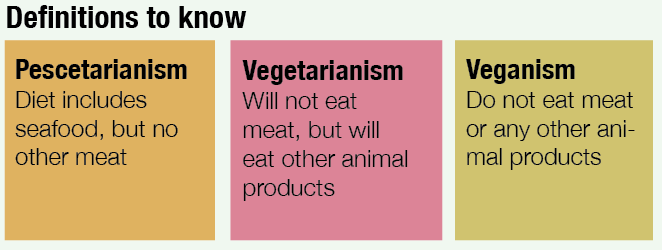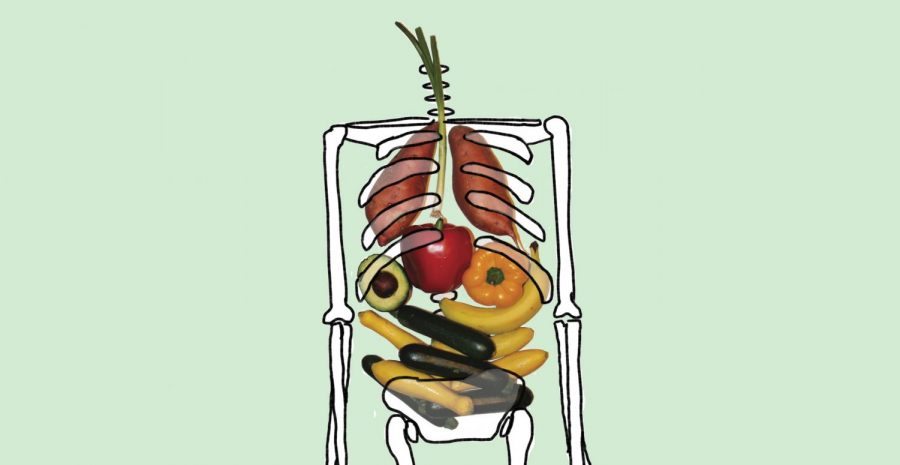Art by Maggie Klaers
Food choices raise health concerns
Dietary trends challenge teenagers
May 10, 2019
Unaware of the possible risks of vegetarianism, senior Grace Adams-Mass became anemic after not eating meat for two years.
According to Adams-Mass, her decision to not eat meat for two years caused her to develop anemia — a condition in which there’s a deficiency of iron in red blood cells.
“I was super iron deficient, even though I was taking iron pills,” Adams-Mass said. “With anemia I was basically able to tell and then get tested because I was feeling really fatigued and having less energy overall.”
As a vegetarian herself, biology teacher Jessica Gust said it is easy for students to lack the necessary nutrients when changing to a vegetarian or vegan diet.
“To be vegetarian, you have to be savvy about understanding where your macro and micro nutrients come from,” Gust said.
Improved cardiovascular health is also a major benefit of a plant-based vegan diet, according to Vegan Club president Lara Garcia, a senior.
“There’s been a lot of proven links between cardiovascular health disease and the consumption of meat as well as dairy because it has a lot of saturated fat,” Garcia said.
Science teacher Al Wachutka warns that Americans who consume meat are at a higher risk of various diseases.
“Our beef is grown to be extra fatty because that’s what the American public wants, and red meats are associated with heart disease and minor afflictions like gout. Red meat is a precursor to that,” Wachutka said.
Adams-Mass said she became a vegetarian for moral and ethical reasons, yet could not continue with that lifestyle.
“I didn’t like the idea of eating meat and killing animals,” Adams-Mass said.
To stay healthy when going vegan, Garcia said it is important to focus on the plant-based aspect of veganism.
“It’s more about eating healthy because you can still eat unhealthy as a vegan,” Garcia said. “But when you’re just eating a variety of whole plants it’s kind of hard to be unhealthy.”
According to Gust, high schoolers especially need to be cognizant of their health when eating vegetarian or vegan.
‘During puberty and your early 20s, you want to make sure that (you’re) setting yourself up to be as healthy as possible when you’re old,” Gust said. “There are huge advantages to eliminating meat from your diet, but at the same time you could be creating other health issues if you’re not careful.”
Adams-Mass said she wishes she would have been more aware of the health impacts before changing her diet.
“Just make sure you know ways to incorporate enough protein and iron into your diet,” Adams-Mass said.

Wachutka said the influx of the transition to veganism and vegetarianism has had a positive impact on the environment.
“Being vegan, when you talk about energy, you’re eliminating an entire level. This is food energy that would be saved,” Wachutka said. “It actually saves quite a bit in terms of carbon dioxide output.”
Garcia said she became vegan because of her concerns with industrial agriculture.
“Cows in industrial agriculture are still slaughtered once they are done producing milk,” Garcia said.
After watching a documentary about the animal industry called “Cowspiracy,” Garcia said she learned about the positive environmental effects of veganism.
“Animal agriculture produces more greenhouse gasses than the whole transportation industry in total, so it’s pretty damaging to the Earth,” Garcia said.
Although junior Matthew Meredith is not vegetarian, he said he sees the environmental impact of not eating meat.
“I understand the environmental aspects of those diets, but I don’t understand how anyone in their right mind could stop eating meat,” Meredith said.
Wachutka said for students who don’t want to become vegetarian or vegan, they can alleviate their impact on the environment by purchasing locally sourced meats.
“If they are buying local, there would be less transportation, so less fuel burned. It would be eliminating machinery and transportation and industry involved in meat packing and selling in the grocery stores,” Wachutka said.
According to SLP Nutrition co-owner Allyson Oman, the local nutrition club that opened in March has seen an increase in visitors, including those who are vegetarian and vegan.
“We do see some people that have restrictions or choose to eat all vegetarian or vegan,” Oman said. “We have a selected protein (for them) because before that, a lot of people didn’t want to necessarily drink the whey protein. This new option is strictly plant-based, so there’s a little bit for everybody.”
Garcia said she was a vegetarian for six months before becoming vegan in order to make the transition smoother and healthier.
“It was way easier and better in my opinion to be vegetarian first. Just to dip your toes in the water and see how it is,” Garcia said.
According to Garcia, the price of veganism was daunting at first, but ultimately turned out to be a cheaper option.
“The price was a really big concern for me because I heard about veganism being really expensive,” Garcia said. “It’s actually way less expensive than when I was eating meat because I mainly swapped out the meat with other forms of protein.”
For students looking into becoming a vegan, Garcia said social media is a great resource to turn to for inspiration.
“I started by going on YouTube and looking at ‘what I eat in a day as a vegan’ videos and that introduced me to a lot of vegan inspiration,” Garcia said. “I followed (vegan influencers) on Instagram, so I knew what to eat as not only a vegan, but as someone who’s very active and wants to keep up with macronutrients.”
Wachutka urges students who want to make the dietary transition to educate themselves and be conscious about the types of foods they are consuming and what nutrients they could be lacking in their diet.
“You have to be better than the average teenager and pay attention to what you’re doing because it is easy to miss out on some very necessary things in your diet, proteins being one of them,” Wachutka said.

